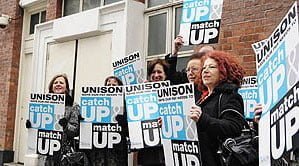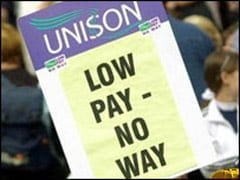Waste, big salaries and huge pensions, that’s the image the
Tories are trying to present of the public sector in Britain today. It’s a bit
rich coming from them, at a time when their rich backers in the City of London
have been exposed as a bunch of greedy parasites. How many years would a
cleaner have to work to earn as much as your average banking tycoon?
 The big lie and the big myth that the Tories and the media
The big lie and the big myth that the Tories and the media
are trying to push is that public sector workers are somehow protected from the
chill wind of recession and that we lead an easy protected life living off
everyone else’s taxes. The reality couldn’t be further from the truth. Low
wages, constant pressure in terms of “efficiency savings” and a never ending
programme of reorganisations. That’s the lot for most rank and file workers in
the public sector. No City of London style bonuses here!
If the public sector is such a paradise for workers, why is
it that there are thousands of vacancies for social workers? Why are there so
many unfilled vacancies in other departments and why are so many workers made
ill with stress?
Meanwhile pensions are under attack, particularly in the
Civil Service – the idea that public sector workers have huge pension payouts
is laughable. A low paid part time cleaner in the NHS with 20 years service
isn’t going to retire on big bucks, far from it. UNISON and the GMB, PCS and
UNITE organise hundreds of thousands of low paid women workers; forget the spin
and political manoeuvring – this is the reality.
The truth is that public services have been stripped to the
bone. This isn’t a new thing; it’s been going on since the 1970’s. Even during
the long forgotten “15 years of uninterrupted economic growth,” that Gordon
Brown was so proud of, the pressure was sustained on the public sector through
a regime of target after target. New money was usually linked to new work and
Tony Blair’s pro big business policies further undermined local government and
the NHS.
Where does that leave us today? Many public services are now
run on a shoestring. Short-term contracts and temporary funding makes it very
difficult to plan for the future. Services are being stretched, as more people
need looking after in their old age for example. The constant threat of
privatisation and outsourcing hangs over workers heads accross the public sector.
Far from supporting public services, New Labour more or less
continued where the Tories left off in 1997. In the current crisis each of the
parties has sought to outdo each other in terms of how they will “deal with” the
cost of delivering public services. This more or less means that it will be
open season on public sector workers as soon as the general election campaign
ends in June next year i.e. cuts, redundancies and attacks on wages and
conditions.
This year local government workers were originally offered
the measly sum of 0.5% by way of a pay rise, with the threat that the offer
would be taken off the table if the unions didn’t agree to it by the first of
June. In the end the members settled for 1% with 1.25% for the lowest paid.
Given the volatility of the inflation rate over the past period this means more
misery for tens of thousands of low paid workers. It’s not going to get any
better either. The Tories now control the Local Government Association and will
be determined to put the bite on. UNISON is looking at a 2.5% claim. It’s going
to be a struggle to win anything this year – which means a struggle will be
needed. At the same time UNISON are fighting to defend the 2.25% award in the
NHS, which could come under threat as a result of the current low inflation
rate.
The next period is going to see huge pressure on workers in
the Civil Service, the NHS and local government. For many years sections of the
trade union leadership have constantly sought to “hold the line” for New
Labour. The outcome has been to sell the members short. The next period, with
the threat of a Tory government sharpening the knives for another huge bout of
cuts, means that trade union organisation is more important than ever. Only
militant action can stop the Tories and New Labour in their tracks.
Want to read more?
Click here to read another article from a unison member about the threat to public sector workers.
Click here to read the socialist case against the cuts.
Click here to read why all the three main political parties seem to be going in the same direction over cuts.
Click here to find out what the Tories really want to do if they get into power.






